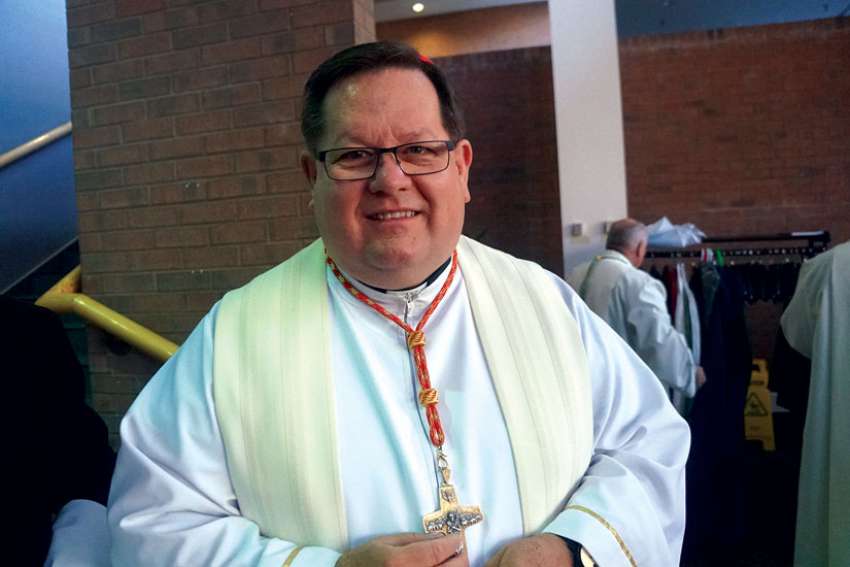“I am sad because we’re missing the most beautiful aspects of this exhortation if we just focus on that,” said Cardinal Gerald Cyprien Lacroix of Quebec City.
The Pope’s document Amoris Laetitia on family love, released last April, is about finding paths to spiritual growth, not doctrinal change, Lacroix said. He believes the document is intended to help couples and families find true fulfilment through the long-standing and rich Church teaching on marriage and family.
The Church has a long history and wonderful doctrine that needs to be taught to young couples and families “so they will discover this is a way of living — that love and marriage is a way of living that is a way to happiness,” Lacroix said. Amoris Laetitia is not a document about changing doctrine but is a blueprint to bring families closer to the Church so they can gain a full understanding of its teachings.
“How are we going to convey this to our brothers and sisters?” he asked. “We have this treasure which is our doctrine, and our experience. The Magisterium — it’s so many beautiful pages on what God wants a family to be, what God is calling couples to live.”
Lacroix said the Church is not going to “dilute or diminish” its doctrine, “but we have to find a way to interest and help our brothers and sisters,” he said. The way to accomplish that is by “accompanying to help them to discern what is fragile in their lives, what’s difficult, what is not up to par with what the Gospel is asking,” he said.
“It is not just hitting you on head with doctrine, and saying you come back when you are perfect,” he said.
“We have nothing to impose, we have something wonderful to propose,” he said. “In fact it’s not something, it’s Someone. It’s Jesus Christ and He is the Way, the Truth and the Life.”
Lacroix’s comments follow a similar endorsement given to the controversial document by Canadian Cardinal Marc Ouellet. Addressing the Knights of Columbus annual convention in Toronto in August, he said controversies around Amoris Laetitia “are understandable” but suggested that critics take time to thoroughly read the 250-page document.
Like Lacroix, Ouellet disagrees with those who have interpreted Amoris Laetitia as a challenge to Church teaching that, for example, may permit some married and divorced couples to receive communion. He said Francis did not indicate a pathway to change doctrine regarding the indissolubility of marriage, but proposed a new pastoral approach that reflects patience, respect and dialogue.
Critics in many countries have expressed concern that a call to discernment, rather than strict adherence to doctrine, may cause bishops in some parts of the world to interpret Amoris Laetitia as an invitation to relax traditional teachings.
Focusing on this one issue, however, is unfortunate because it risks people losing sight of the overriding message of Amoris Laetitia. The document’s primary goal, said Lacroix, is to bring “people to a personal relationship with Him.”
People need to know God in order to be introduced to all aspects of faith. At its core, therefore, Amoris Laetitia is an evangelization document. It opens the doors of the Church to families so that they can be taught the doctrinal, bio-ethical and moral issues, Lacroix said.
“That’s a consequence (of evangelization). You don’t start by that.
“Evangelization starts by kerygma — bringing people to meet and to welcome Jesus Christ in their lives” he said. “Then the rest comes. Then you learn what you have to do to put your life in order. That comes out very clearly in this Apostolic Exhortation.”
The message of Amoris Laetitia is that there “is room in our Church for every family,” he said. “We’ll take you and we’ll walk with you.”
Once families embrace the Church, holiness, faithfulness and obedience to God’s Word will follow, Lacroix said.
“That’s what we’re pointing to, but we’ll take the time to get there. You want to make it? We’ll help you. That is the key to understanding this (Amoris Laetitia).”
The cardinal said he has seen much evidence during his life as a priest to show this approach works.
“If they want to grow, the Lord will help them but we have to be on their side,” he said.
“I’ve seen people start off in something that was not a project in line with what God wanted, but with time, tender loving care, with help, and welcoming them into community, they discovered the fullness of Sacrament of Marriage, the fullness of Christian life,” he said. “It’s not only true for the people we accompany, it’s true for me.
“I didn’t come to live the Gospel right away in the fullness of what it calls us to be and I’m still struggling with it,” he said. “Thank God for God’s mercy and forgiveness and patience with me and with all of us.
“So why should we be so hard on other people?” he asked, noting the Year of Mercy is helping people understand this concept.


